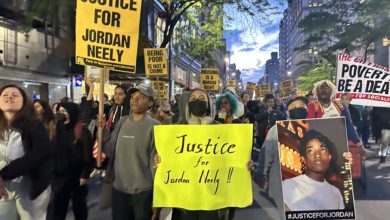The movement for African American reparations is gaining momentum. For decades, Black people have demanded compensation from the U.S. government and corporations for the horrors of slavery and Jim Crow apartheid.
In July, the bourgeois media ran a number of stories recognizing the growth of the reparations movement. The sudden interest was sparked by the recent apologies by the Moravian and Episcopal churches for their participation in the slave trade. Both churches owned slaves. The Episcopalians also launched a national probe into church slavery links to determine whether the church should compensate Black members.
The church apologies followed on the heels of a June recommendation by an official North Carolina commission, which stated that reparations should be paid to the descendents of victims of the brutal seizure of the Wilmington local government after a white supremacist-led coup unseated the Black government in 1898. The defeat of the elected city government of Wilmington marked the end of all gains by Blacks during the period after the U.S. Civil War, called the Reconstruction Period.
The Wilmington commission report came weeks after the Organization of American States requested information from the U.S. government about a 1921 race riot in Tulsa, Okla., in which 1,200 homes were burned and as many as 300 Blacks killed. An OAS official said the group might pursue the issue as a violation of international human rights.
The modern reparations movement revived an idea that’s been around since emancipation, when Black leaders correctly argued that newly freed slaves deserved compensation.
These admissions, reports and other recent revelations highlight a very important issue in the fight for reparations and racial equality—the central role of the heinous, destructive and murderous capitalist system.
Capitalism built by genocide and slavery
Marx described capitalism at the dawn of its existence as a system that came into the world with blood dripping from every pore. He was referring to the role of the African slave trade, the genocide of Indigenous peoples in the Americas and the colonial enslavement of whole peoples as the precondition for the original accumulation of capital.
At least 12 million Africans were taken to the Americas as slaves. The current economic system in the United States was built largely on the backs of slave labor. Major banks and corporations that participated in the genocidal slave trade still exist in some form today. They reaped enormous profits from engaging in this inhuman practice.
Corporations like CSX, Fleet Boston, Aetna, and JP Morgan Chase, all were started with profits reaped from exploiting slave labor. CSX is the present permutation of a company that used slave labor to lay railroad tracks. Fleet Boston—now incorporated into Bank of America—is a bank that was founded by a slave trader. Aetna and JP Morgan Chase made millions insuring slaves as the property of their masters.
Universities like Yale, Harvard, Princeton and Virginia also profited from slave labor.
It is not only specific companies or schools that owe reparations; the U.S. government must pay as well. Slave labor built the White House. The so-called “founding fathers” of America owned slaves. For nearly 100 years, the U.S. government and their capitalist partners reaped massive profits dripping with the blood of African slaves.
While some companies and organizations have expressed some willingness to remunerate Black people in different ways—JP Morgan started a five million dollar scholarship fund for African Americans—most have refused to acknowledge their liability for reaping benefits from the slave system.
It is absolutely necessary that the Black community be compensated fully, with interest, for the historical racism and wrongs forced upon them by capitalist America. However since the true amount owed by different companies and institutions is likely to be a significant portion of their current resources, and because they still seek to make profits in any way they can, capitalist resistance is inevitable.
The necessity of reparations
Opponents of reparations frequently say that Black people today shouldn’t be compensated for their enslavement because no slave owners or traders are still alive. But this narrow outlook ignores the brutal, racist character of U.S. history. It allows slavery or any other past wrong to be swept away without any accountability or rectification.
It also ignores how the legacy of slavery and Jim Crow continues to affect Black people in the United States. Slavery and its apartheid aftermath created the economic disparities now facing tens of millions of African Americans.
Workers of all nationalities should support and fight for the just demand of reparations for the Black community. Reparations would not hurt workers one bit. The goal of the reparations movement has never been to take money from individuals, but to restore to Black people the wealth stolen from them by corporations, institutions and the government.
If corporations and the U.S. government are forced to compensate fully African Americans, the working class as a whole will score an important victory in the struggle for a better world.
The reparations struggle is one of the key aspects in achieving equality for Black people in the United States, and for building much-needed working-class unity in the face of racist capitalism. The wealth that built the United States and started these corporations and many more must be accounted for before there can be justice.





